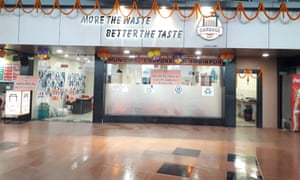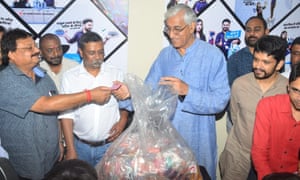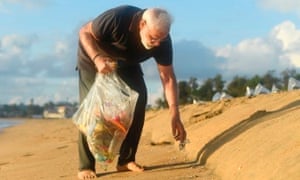From rubbish to rice: the cafe that gives food in exchange for plastic
Article from: Guardian
Author: Amrit Dhillon
On bad days, when his employer made some excuse for not paying him his paltry daily wage, Ram Yadav’s main meal used to be dry chapatis, with salt and raw onion for flavour. Sometimes he just went hungry. For a ragpicker like him, one of the thousands of Indians who make a living bringing in plastic waste for recycling, eating in a cafe or restaurant was the stuff of fairytales.
But last week, Yadav was sitting at a table at the Garbage Cafe in Ambikapur, in the state of Chhattisgarh, over a piping hot meal of dal, aloo gobi, poppadoms and rice. He earned the food in exchange for bringing in 1kg of plastic waste. “The hot meal I get here lasts me all day. And it feels good to sit at a table like everyone else,” he said.
Opened in October by the Ambikapur municipal corporation, the cafe is designed both to encourage awareness about the need to collect and remove plastic waste and to give a meal to anyone – ragpicker, student or civic-minded individual – who does so. The tagline? “More the waste, better the taste.”
The Garbage Cafe, opened by the Ambikapur Municipal Corporation in October, gives a meal to anyone who brings in plastic waste. Photograph: Amrit Dhillon
The launch was attended by the Chhattisgarh health minister, TS Singh Deo, who emphasised that the cafe was for everyone by bringing in half a kilo of plastic himself.
“It’s become well known fast, because it’s located right by the main bus stand in the city,” said the city’s mayor, Ajay Tirkey. “We’re getting about a dozen people coming in every day. One day a whole family came in with huge sacks weighing seven kilos.”
Most Indian cities are struggling with huge amounts of unsegregated waste. There are few effective waste-management systems, and according to the country’s environment ministry the country generates approximately 25,000 tonnes of plastic waste every day – only about 14,000 tonnes of which are collected.
Chhattisgarh health minister, TS Singh Deo, right, brought half a kilo of plastic to the launch of the Garbage Cafe to emphasise that the scheme was for everyone. Photograph: Amrit Dhillon
A modest effort to push back against single-use plastic received a boost in October, when the prime minster, Narendra Modi, used the occasion of the 150th anniversary of Mahatma Gandhi’s birth to announce that India would phase out single-use plastic by 2022 (though he stopped short of a blanket ban). Later that month, during a visit to Tamil Nadu state, he went for a morning walk by the sea at Mamallapuram and ended up “plogging” on the beach.
The cafe’s concept of bartering food for plastic waste is catching on elsewhere, too. In Siliguri, West Bengal, the alumni of a local school are distributing free food on Saturdays to anyone who deposits half a kilo of plastic waste. At the other end of the country in Mulugu in Telangana state, the town authorities give one kilo of rice in return for one kilo of plastic. Local school children also go around collecting plastic. The district collector of Mulugu has said he wants to make his district the first in India to be free of single use plastic. The enthusiasm is proving infections: one local couple sent out wedding invitations printed on reusable cloth grocery bags.
Prime Minister Narendra Modi collects rubbish from a beach in Mamallapuram. Photograph: AP
It has now reached the capital, New Delhi, where municipal authorities plan to open several Garbage Cafes along the lines of the one in Ambikapur. About 70% of the city’s plastic waste is single use, and most of it ends up in landfills or clogging drains. It is a particular menace for hungry cows who end up rummaging through garbage bins and eating plastic. Last year, a vet in Delhi removed 70kg of plastic from a cow’s stomach.
“How many schemes solve two problems in one go? The cafe tackles waste and also gives hungry people a hot meal which in turn motivates them to collect more plastic,” she said.
Tirkey stresses the importance of that loop. “What’s important is that our meals are nutritious and tasty. We didn’t want to give rubbish.”





